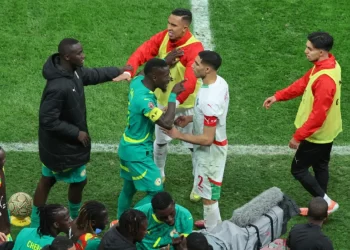Ghanaian boxing, once celebrated across the continent for producing world champions and household names, has found itself at a crossroads in recent years.
The shocking deaths of Nigerian pugilist Gabriel Oluwasegun Olanrewaju and Ghana’s own Ernest Akushey, popularly known as “Bahubali,” after bouts at the Bukom Boxing Arena, have cast a shadow over the sport, raising urgent questions about safety, regulation, and credibility.
In response, the Ministry of Sports and Recreation has inaugurated a nine-member Interim Management Committee (IMC) to restore professionalism and order.
At the helm of this reform team is former Ghana Boxing Authority (GBA) president, Samir Captan, who has pledged to return Ghanaian boxing to its “glory days.”
Captan, a respected administrator with decades of experience, minced no words during the committee’s inauguration in Accra, declaring that “law is law,” and promising to enforce reforms with firm resolve.
Joining him in this mission is Ghana’s most decorated boxing export, Azumah Nelson, who will serve as Vice Chairman and Special Technical Advisor.
Nelson’s presence has electrified the reform agenda, with many observers seeing his involvement as a sign that boxing’s most legendary son is ready to give back by shaping the future of the sport.
“Boxing has made me who I am,” Nelson noted, adding that he would do everything possible to ensure younger generations benefit from safer, better-regulated structures.
The IMC also includes a blend of seasoned professionals drawn from medical, technical, and administrative fields. Members such as Dr. Hadi Mohammed, Dr. Ofori Asare, Felix Quartey, Lester Kwateng, and Prince Azanu bring expertise spanning athlete welfare, training, and organisational management. Patrick Johnson has been appointed secretary, tasked with coordinating the committee’s work and liaising with government and stakeholders.
Among its immediate responsibilities, the IMC will restructure the Professional Boxing Association, enforce strict medical and insurance requirements for fighters, and strengthen safety standards at boxing venues.
These measures are seen as critical to rebuilding trust after the fatalities that rocked the fraternity.
A ministerial inquiry into Olanrewaju’s death had earlier recommended sweeping changes to Ghana’s boxing administration, including the suspension of bouts until structural issues were addressed.
Indeed, the temporary suspension of boxing in Ghana following the death of Bahubali has been one of the most controversial decisions in recent sporting history.
While some stakeholders described it as unlawful and damaging to the livelihoods of boxers and promoters, others insisted that a pause was necessary to protect athletes and prevent further tragedy.
Captan and his team now carry the responsibility of charting a roadmap that balances urgency with sustainability.
Key to their work will be organising transparent elections to usher in a new set of executives for the GBA. The IMC is not meant to be a permanent replacement but a caretaker body designed to clean the slate, restore discipline, and prepare the ground for a stronger, more accountable leadership structure.
For many, the reforms come at a defining moment. Ghana, which has produced global champions such as Ike Quartey, Azumah Nelson, and Joseph Agbeko, has long prided itself as a boxing powerhouse.
Yet recent mismanagement, poor facilities, and a lack of adequate safety measures have eroded confidence and placed athletes at risk.
The deaths of Olanrewaju and Bahubali were not isolated tragedies but stark reminders of the cracks that have been widening in the system for years.
Stakeholders believe that the combined leadership of Captan and Azumah Nelson could signal a turning point in boxing. Captan’s administrative rigour, matched with Azumah Nelson’s charisma and technical know-how, is being hailed as a partnership capable of uniting a fractured sport.
Already, Nelson has urged promoters, coaches, and boxers themselves to embrace discipline and accountability, reminding them that the reputation of Ghanaian boxing is at stake.
International bodies and development partners are also watching developments closely.
The Ghanaian government, through the Ministry of Sports and the National Sports Authority, has expressed confidence that the IMC will not only correct the failings of the past but also position Ghanaian boxing to reclaim its reputation on the global stage.
The road ahead, however, will not be easy. Funding remains a persistent challenge, with many boxing gyms in Accra and other regions struggling to equip fighters.
Medical infrastructure, from ringside doctors to post-bout monitoring, will require significant investment.
There is also the matter of rebuilding public confidence, particularly among fans and families shaken by recent tragedies.
Still, the optimism is palpable. The IMC’s inauguration has been described by many as “a new dawn” for the sport.
With Azumah Nelson lending his credibility and Samir Captan promising uncompromising reforms, Ghanaian boxing may finally be on the path to safety, professionalism, and renewed international respect.
As Captan put it at the inauguration: “We have accepted this position to streamline boxing back to its glory days. We are going to implement it strongly.”
For a sport built on grit, endurance, and resilience, the fight for reform may be Ghanaian boxing’s toughest bout yet—but one it cannot afford to lose.













